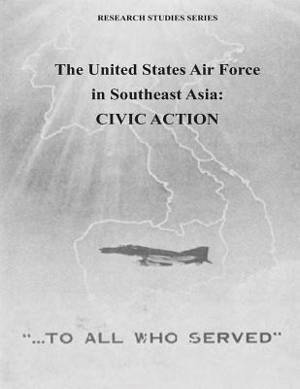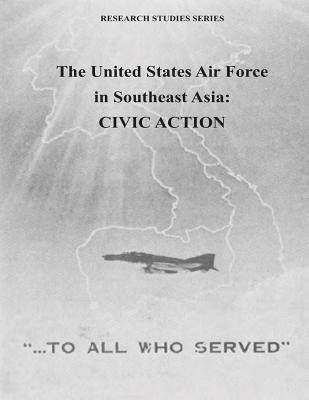
Wil je zeker zijn dat je cadeautjes op tijd onder de kerstboom liggen? Onze winkels ontvangen jou met open armen. Nu met extra openingsuren op zondag!
- Afhalen na 1 uur in een winkel met voorraad
- Gratis thuislevering in België vanaf € 30
- Ruim aanbod met 7 miljoen producten
Wil je zeker zijn dat je cadeautjes op tijd onder de kerstboom liggen? Onze winkels ontvangen jou met open armen. Nu met extra openingsuren op zondag!
- Afhalen na 1 uur in een winkel met voorraad
- Gratis thuislevering in België vanaf € 30
- Ruim aanbod met 7 miljoen producten
Zoeken
The United States Air Force in Southeast Asia
Civic Action
U S Air Force, Office of Air Force History
€ 31,45
+ 62 punten
Omschrijving
This is the first in a series of research studies-historical works that were not published for various reasons. Yet, the material contained therein was deemed to be of enduring value to Air Force members and scholars. These works were minimally edited and printed in a limited edition to reach a small audience that may find them useful. We invite readers to provide feedback to the Air Force History and Museums Program.Capt. Betty L. Barton Christiansen, a member of the staff in the Office of Air Force History, researched and wrote this volume. She begins by establishing a framework of the civic action concept. Chapter II discusses the period corresponding to the Kennedy administration, when both government and military officials grappled with adjusting to a "new kind of war," the origins of counterinsurgency strategy (of which civic action was a part), and the efforts to apply this strategy in Vietnam. The nation-building period discussed in Chapter III, covers the period from November 1963 to July 1965, a time of great instability in South Vietnam, and the myriad efforts by the USAF to establish unity. Although he had promised to continue the policies of President Kennedy, Lyndon Johnson began to "lean away" from political and other non-military solutions to the crisis in Vietnam. This was reflected in the attitudes of the various services toward unconventional warfare and civic action. By 1966, while military solutions occupied center stage, some stability had been established in Vietnam. More attention was being paid to winning popular allegiance and USAF's Seventh Air Force formally organized its civic action activities. However, just as the program showed signs of success, the Tet offensive intervened. Thus, Chapter V demonstrates that instead of serving as advisers to the Vietnamese, the USAF civic action effort was compelled to revert to an earlier phase of its development, when humanitarian services were emphasized. Still, the program recuperated completely by July 1968. In Chapter VI, the South Vietnamese government embarked on an accelerated pacification program to extend its control throughout the country. Civic action constituted one part of this effort. Seventh Air Force sought to improve training civic action personnel, increase the number of civic action officers "in country," and obtain more resources for the program. These refinements provided a better understanding of civic action and showed the benefits of increased South Vietnamese participation. By the end of 1968, pacification had become a major part of allied strategy in Vietnam. The results of the various changes in the civic action program are discussed and assessed.
Specificaties
Betrokkenen
- Auteur(s):
- Uitgeverij:
Inhoud
- Aantal bladzijden:
- 286
- Taal:
- Engels
- Reeks:
Eigenschappen
- Productcode (EAN):
- 9781508815907
- Verschijningsdatum:
- 12/03/2015
- Uitvoering:
- Paperback
- Formaat:
- Trade paperback (VS)
- Afmetingen:
- 216 mm x 280 mm
- Gewicht:
- 666 g

Alleen bij Standaard Boekhandel
+ 62 punten op je klantenkaart van Standaard Boekhandel
Beoordelingen
We publiceren alleen reviews die voldoen aan de voorwaarden voor reviews. Bekijk onze voorwaarden voor reviews.











